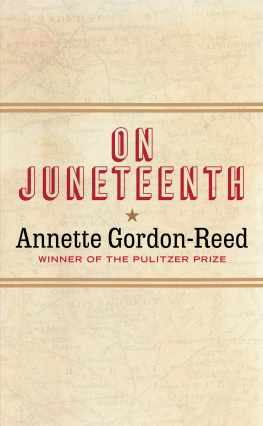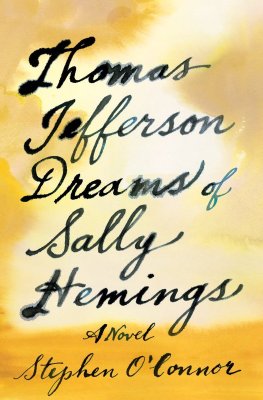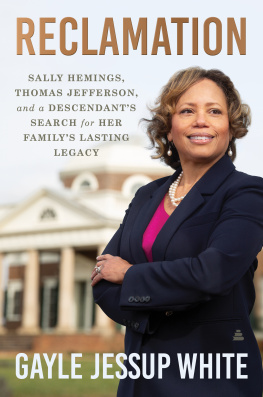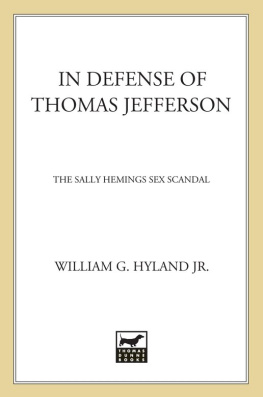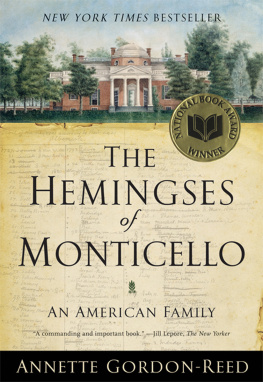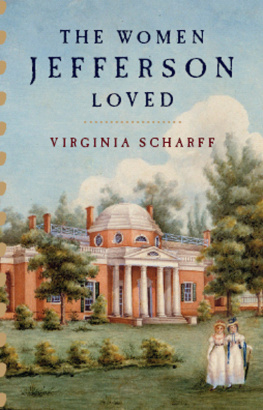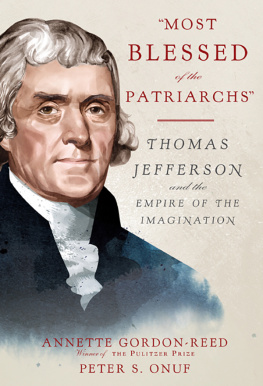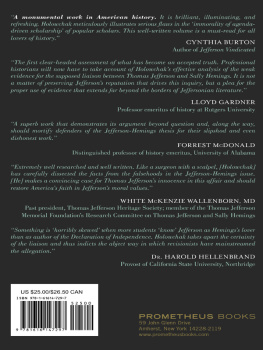THOMAS JEFFERSON
AND
SALLY HEMINGS
An American Controversy
I write then in a field devastated by passion and belief. Naturally, as a Negro, I cannot do this writing without believing in the essential humanity of Negroes, in their ability to be educated, to do the work of the modern world, to take their place as equal citizens with others. I cannot for a moment subscribe to that bizarre doctrine of race that makes most men inferior to the few. But, too, as a student of science, I want to be fair, objective and judicial; to let no searing of the memory by intolerable insult and cruelty make me fail to sympathize with human frailties and contradiction, in the eternal paradox of good and evil. But armed and warned by all this, and fortified by long study of the facts, I stand at the end of this writing, literally aghast at what American historians have done to this field.
W. E. B. Du Bois, The Propaganda of History
University of Virginia Press
1997 by the Rector and Visitors of the University of Virginia
All rights reserved
Printed in the United States of America on acid-free paper
First published 1997
First paperback edition published 1998
ISBN 978-0-8139-1833-4 (paper)
13 15 17 19 18 16 14 12
Library of Congress Cataloging-in Publication Data
Gordon-Reed, Annette.
Thomas Jefferson and Sally Hemings: an American controversy / Annette Gordon-Reed.
p. cm.
Includes bibliographical references and index.
ISBN 0-8139-1698-4 (cloth: acid free paper)
ISBN 0-8139-1833-2
1. Jefferson, Thomas, 17431826Relations with women. 2. Jefferson, Thomas, 17431826Relations with slaves. 3. Hemings, Sally. I. Title.
E332.2.G67 1997
973.4'6'092
[B]dc20
96-34550
CIP
Authors Note
I WROTE IN the Preface to this books first edition that the final word on the controversy over whether Thomas Jefferson had a long-standing relationship with Sally Hemings would likely come as the result of the miracles of modern science and all the wonders of DNA research, and not because of any interpretation of documents and statements. I suggested this not because I believed that the documentary record available at the time of my writing was insufficient to provide a reasonable answer. It was sufficient. I believed at the time (and now) that the bar to resolution was more psychological than evidentiary. It appeared that no one in the historical community wanted the question answered or thought it important to do so. Save for Fawn Brodies 1974 biography of Jefferson, Thomas Jefferson: An Intimate History, no historian had undertaken the kind of research necessary to put the matter to rest one way or the other. Had they wanted to, they could have. It seemed unlikely, therefore, that an appeal based upon the normal gathering and analyzing of information, applying logic, drawing inferences from circumstances, would suffice.
The story of Jefferson and Hemings was hostage to both passion and indifferencepassion from those wedded to the vision of Jefferson crafted by his most well-known biographers who presented him as a southern gentleman dedicated to the life of the mind and devoid of sexuality. For them, the matter was beyond contemplation, let alone careful consideration. At the same time there were other historians and commentators who wrote of the matter as if they had no feelings about Jefferson and Hemings one way or the other. They would not have been upset if the story was true. Instead, their resistance grew from their notion that psychological and/or physical factorsJefferson was a racist; Jefferson was impotentwould have prevented an affair with Hemings. While these positions moved beyond the undercurrent of hysteria in the traditional response, they maintained the basic circularity of the Old Guard opinion and continued to ignore what was really at stake: proper regard for the humanity and integrity of blacks who were enslaved at Monticello.
As much as some wished the story would go away, Sally Hemings could never simply disappear from writings about Jefferson. James Callender, who first wrote publicly about Hemings, was a part of Jeffersons political life. How he went from being friend to foe of Jefferson, his crusade against the president waged in the pages of the Richmond Recorder, and how Jefferson and his comrades dealt with the matter would always be a necessary part of any complete recounting of Jeffersons life storyeven if the charges were written of to be dismissed out of hand.
That Jeffersons family weighed in on the question also assured its continued vitality. The claim of Jeffersons grandchildren Thomas Jefferson Randolph and Ellen Randolph Coolidge that one or the other of Jeffersons nephews Peter and Samuel Carr fathered the Hemings children became an important part of the historical record, providing an antidote to the Hemings story. The memoirs of Madison Hemings and Israel Jefferson presented a strong, if much too neglected, counterstory to the Randolph family narrative. There was enough in all of this to constantly fuel the publics general interest in the subject. Through it all the question hung in the air: Did he or didnt he?
When this book first appeared in 1997, to the chagrin of some and, no doubt, to the relief of others, I stated firmly that the book was not primarily directed toward answering that questionalthough for many readers and reviewers that was its indirect result. The more important feature of the Jefferson-Hemings debate, I believed, was what it said about the views of Americansand it must be said, some white Americansabout the proper relationship between blacks and whites. This was not just on the sexual front (not even mainly on the sexual front) but in terms of the proper power relationship between the two groups overall.
The treatment of the story well into modern times is evidence of the continuing grip that the doctrine of white supremacy has on American society. The historiography displays carelessness with the lives of enslaved men and women, disrespect for the sensibilities of their descendants, and a concomitant willingness to safeguard the interests of those who held blacks in bondagesometimes at the cost of all reason. The picture that emerged from this, for me, revealed the ways in which our distorted racial values, set down in the time of slavery, promote and protect error, irrationality, and unfairness. As if we had fallen through the looking glass, the chief purveyors of the distortion presented themselves, and were accepted, as models of accuracy, rationality, and fairness.
In what universe could the humanity, family integrity, and honor of slave owners count for more than the humanity, family integrity, and honor of slaves? We know one answer to this because that universe existed on the American continent for over two and a half centuries. Although we can attempt to put ourselves in the minds of those who resided comfortably in that place to try to understand and explain their ways, we do not have to stay there when we assess the meaning and import of information gathered from that time. Sally Hemings and her children may have meant nothing to most white Virginians of their day; we are not required to act as if they mean nothing to us. In fact, we are in a very good position to calibrate the balance of competing interests that existed during that morally compromised era.





